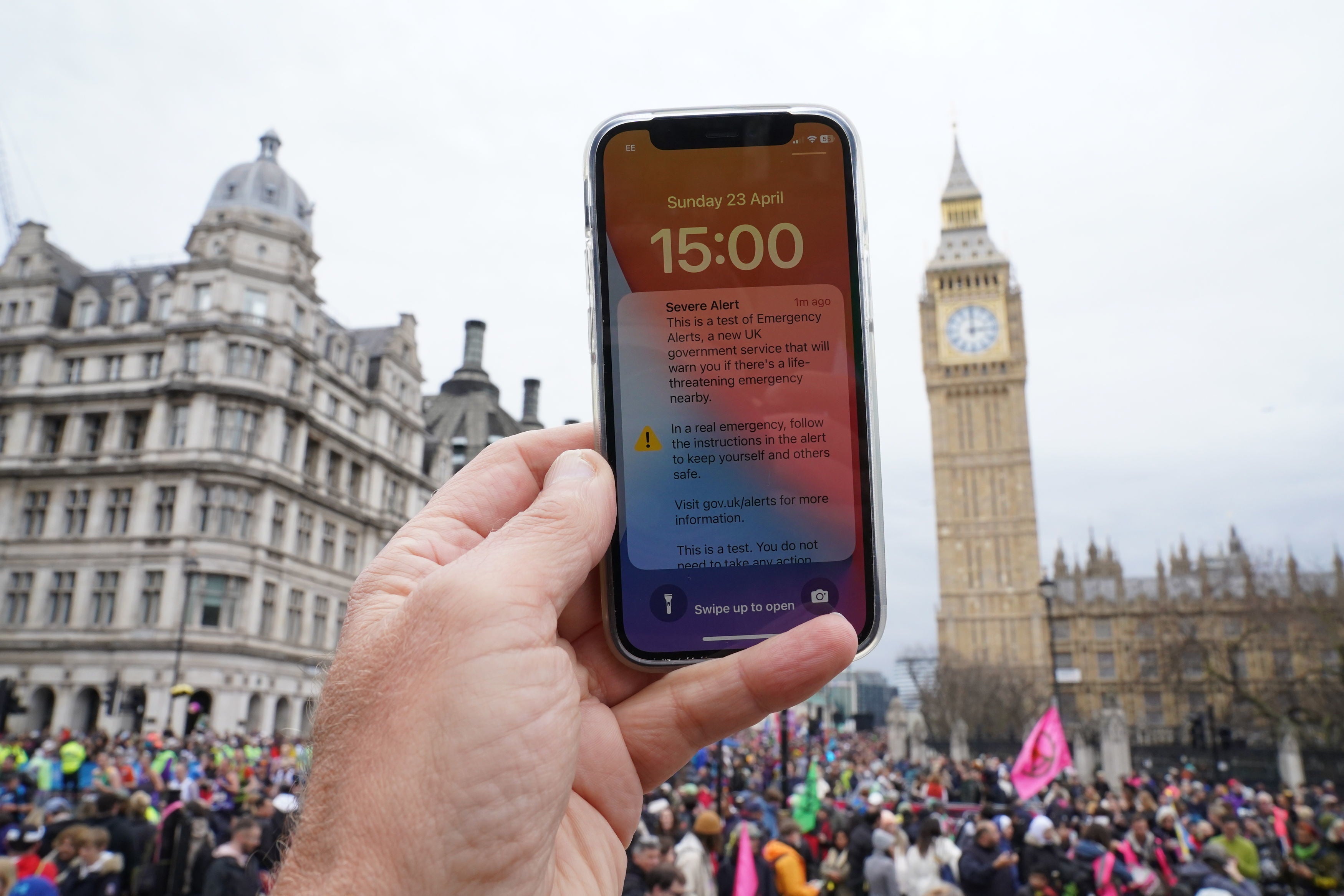Emergency alert: Why did phone users get test at different times
While the alert was scheduled to go out at 3pm, many mobile phone users complained that they received the alert at 2.59pm

Your support helps us to tell the story
From reproductive rights to climate change to Big Tech, The Independent is on the ground when the story is developing. Whether it's investigating the financials of Elon Musk's pro-Trump PAC or producing our latest documentary, 'The A Word', which shines a light on the American women fighting for reproductive rights, we know how important it is to parse out the facts from the messaging.
At such a critical moment in US history, we need reporters on the ground. Your donation allows us to keep sending journalists to speak to both sides of the story.
The Independent is trusted by Americans across the entire political spectrum. And unlike many other quality news outlets, we choose not to lock Americans out of our reporting and analysis with paywalls. We believe quality journalism should be available to everyone, paid for by those who can afford it.
Your support makes all the difference.Millions of people across the country received the first-ever nationwide test of the government’s new emergency alert system today.
While the alert was scheduled to go out at 3pm, many mobile phone users complained that they received the alert at 2.59pm – startling or scaring them because it went off earlier than expected.
The Independent understands it happened because the alert had to go through different infrastructure used by mobile operators – which don’t all operate at the same speed.

A government source said they always expected it to be “around 3pm” because of the differences in the operators’ networks.
Meanwhile, some Britons said they received the alert after 3pm, while others did not receive it at all.
Customers on the Three mobile phone network were among those to report not receiving the communication test.
One social media user said: “I’m a Three customer. Settings on, software updated but no emergency alert received. Clearly the apocalypse will be an anticlimax for some..”
In a statement posted on Twitter, the company said it is aware a number of customers did not receive the alert, and it is working with the government to prevent this in the future.
A Three spokesperson said: “We are aware that a number of customers have not received the test alert.
“We are working closely with the government to understand why and ensure it doesn’t happen when the system is in use.”
A small number of people have also taken to social media to flag that they have not been able to make or receive calls since the 3pm alarm went off on their device.
However, the Cabinet Office stated that engineers had not spotted a trend of phone functions failing to work afterwards, but said officials were in the early stages of analysing the results of the trial run.
The Cabinet Office said it would be reviewing the outcome of the UK-wide test of the new emergency alert system.
The department said that, while the vast majority of compatible phones received the alert, officials were aware that a “very small proportion of mobile users on some networks did not receive it”.
It said that would be looked into as part of the review of Sunday’s test.
A UK government spokesman said: “We have effectively completed the test of the UK-wide Emergency Alerts system, the biggest public communications exercise of its kind ever done.
“We are working with mobile network operators to review the outcome and any lessons learned.”
The system is intended to be used in life-threatening situations including flooding and wildfires but some Britons have now raised concerns that the alerts would not be a success given a large proportion of people did not receive it.
The message was sent to 4G and 5G mobile phones, with sound and vibration for up to 10 seconds.
Phone users were prompted to acknowledge the alert by swiping or clicking the message before being able to continue using their device.
Speaking before the test, Deputy Prime Minister Oliver Dowden conceded the drill could be “annoying”, but that it had the potential to save people’s lives once rolled out.
He told Sky News that the trial run was a “bit like when the fire alarm goes off at work”.
“It’s a bit irritating at the time but in the future people could be grateful for it because in a real emergency, this could be the sound that saves your life,” he said.
The Cabinet minister denied the new system was an example of nanny state interference, telling the BBC he did not accept “that characterisation”.
People who do not wish to receive future alerts will be able to opt out using their device settings but officials hope the life-saving potential of the messages means users will keep them on.
The test message that appeared on phones said: “This is a test of Emergency Alerts, a new UK Government service that will warn you if there’s a life-threatening emergency nearby.
“In a real emergency, follow the instructions in the alert to keep yourself and others safe.
“Visit gov.uk/alerts for more information.
“This is a test. You do not need to take any action.”



Join our commenting forum
Join thought-provoking conversations, follow other Independent readers and see their replies
Comments